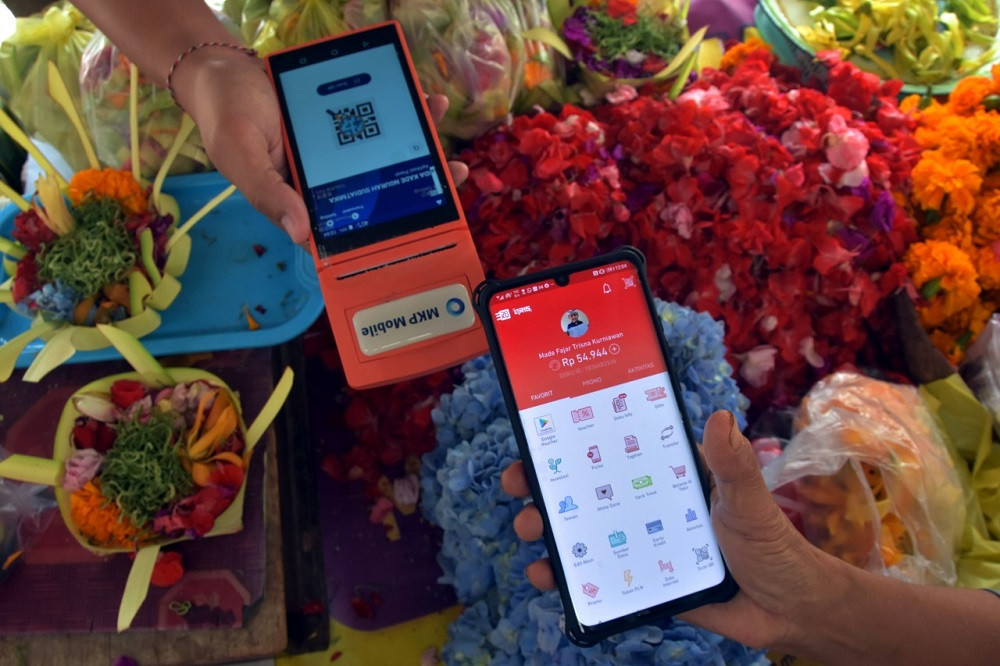A glimpse at Indonesia's fascinating fintech storyboard
Indonesian merchants are no longer satisfied with straightforward products but require something much more valuable to them, namely insights to run their businesses better.
Change Size

H
aving worked in the tech space for the last 20 years with a focus on fintech and payments over the last 10, I can confidently say there has never been a more exciting time to be in business, whether you are a small business startup, or even at the enterprise level, especially here in Indonesia.
Fintechs’ approach to business has changed. For the last few years fintech players have spent a large amount of energy and resources on onboarding, or in other words trying to convince businesses to go online and take advantage of fintech services to grow and take advantage of a digital economy that is estimated to reach US$124 billion in the next four years, according to the e-Conomy SEA 2020 Report by Google, Temasek and Bain & Company.
And while Indonesian businesses over the last 18 months have moved to digital extraordinarily quickly and reaching levels that it took China six years and India four years to reach, the Indonesian Ministry of Cooperatives and Small and Medium Enterprises (SMEs) shares that of the 65 million SMEs in Indonesia, there are only 21 percent that went online.
With the large number of SMEs that are yet to go online, in order to motivate the next surge online, the fintech industry must change its approach from onboarding to storyboarding.
A storyboard in the simplest terms is a graphical narrative that clearly outlines the path of a story. A storyboard of the fintech and payments space outlines the path the industry must take to make the most compelling reason for businesses to go online. In Indonesia’s fintech storyboard, there are three key areas where the industry can meet the needs and provide the most benefit to both businesses and consumers.
First is the clear link between the growth of both online and offline businesses with the growth of electronic payments and payment options in contrast with cash. Indonesian consumers, faced with extended stay/work from home practices, have continued their social and exploratory habits online. And as the consumer's online experiences grow, their demands grow.
Initially, it may have been a welcome surprise that the local warung (kiosks) had moved online and could now accept various types of payments, doing away with the "cash only” sign, but today, where every second of the consumer's time online counts, the storyboard requires fintech and payments to provide solutions to significantly cut transaction times, making transactions more efficient (lesser fees), make one-step payments the norm, and allow for “buy now pay later” options.
Second is the country’s continuous investment in payment systems and standards. The world’s eyes have been on Indonesia and the implementation of the Quick Response Code Indonesian Standard (QRIS) payment system which has created numerous efficiencies and cost savings and encouraged Indonesians to be more comfortable with mobile payments. It is the stage now for the next step of evolution and it is exciting to see national players stepping up.
After launching SNAP as a national open Application Programming Interface (API) standard to create unified national payments, Bank Indonesia (BI) has just started a pilot project for cross-border QR payments. Under the linkages, consumers will be able to use cross-border QR payments to purchase goods and services from merchants in different countries and vice-versa.
Not only benefits the e-commerce and tourism sector in the region, the initiative would be able to accelerate digital transformation and financial inclusion in Indonesia. Even more powerful is that the open API standard will provide opportunities for MSME growth by sharing loan assessment metrics between banks and fintech.
The keyword here is “standard” where a similar approach to APIs will help us drive adoption and efficiencies the way UPI did for India.
Third, the Indonesian fintech storyboard is largely driven by business demands which are not only demanding bottom and top-line support but demanding that fintech players must change to survive.
Indonesian merchants are no longer satisfied with straightforward products but require something much more valuable to them, namely insights to run their businesses better.
Currently, businesses have the ability to track their customers on what they browse, buy, and wish list, every time they come into their offline or online store. Fintech and payments providers, however, can provide rich insight into the full consumer's buying and browsing experience, allowing for businesses to adjust to consumer's needs with customized landing pages, and also to create a safer and more secure environment as fraud will be much easier to detect – while adhering to personal data protection regulations.
It is rare to use the words exciting and fintech in the same sentence, but it is a fitting combination when looking at Indonesia's dynamic fintech storyboard. Indonesia's high smartphone adoption rate, and the fact that most newer generations of smartphones will include Near Field Communication (NFC) technologies, making payments delivery and acceptance accessible to everyone, regulations which are world standard - e.g. the new regulations around Open API by BI - all will coalesce together to benefit everyone in the ecosystem - consumers, merchants, and fintechs.
***
The writer is head of merchant payment, GoTo Financial.









